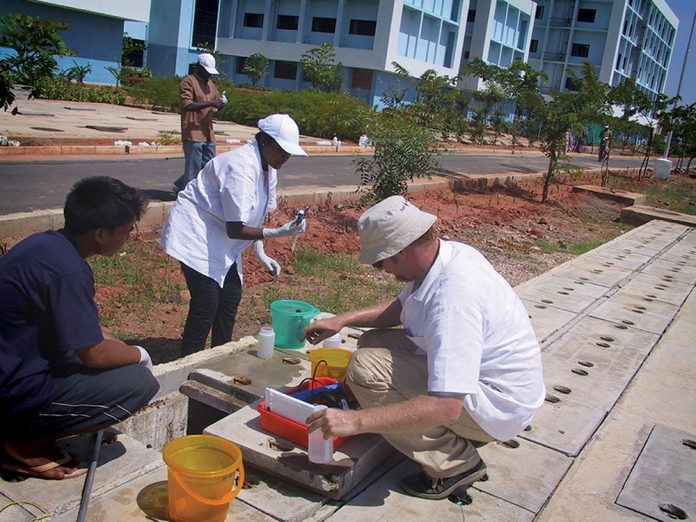Towards Habitat III and beyond: Key elements for a new urban agenda
The water and sanitation targets of Millennium Development Goal 7 were not met in many countries. In September 2015, the United Nations General Assembly adopted Sustainable Development Goal 6, which is designated to ensure “availability and sustainable management of water and sanitation for all” by the year 2030. Do we need new models for managing water resources in order to achieve the new goal?

Yes, I think we do need new models for managing water as a local, regional, basin, and global issue. On a global level, the Sustainable Development Goals (SDGs) provide both a vision and an agenda for transforming our world. Their implementation requires us to think in interlinkages and synergies. We are used to thinking and acting in silos of fragmented and rather one-dimensional sectors and institutions. This applies to our sciences, our ministries, and our technologies. The business-as-usual approach resulted in today’s unfinished business of MDG 7 and in fact represents a systemic challenge. If we really want to go for a more integrated agenda as suggested by the SDGs, we need to bear in mind that the bulk of the job is still ahead of us: we may have the vision but we need to figure out the implementation. Yet, you are not implementing a vision back at home–you are implementing projects. We therefore need to translate the vision into national, regional and local realities and targets. And although the primary responsibility lies with the governments, they cannot do it alone– collaboration with all stakeholders of society is necessary. This raises the question for the global level: where in the system is the platform for intergovernmental water cooperation? If we expect governments to deliver, where is the platform facilitating their co-operation? There is none. The SDG 6 on water is not a stand-alone goal; instead, it is dedicated to and interlinked with at least ten of the seventeen SDGs. If we really want to address the systemic challenge, we need to think in terms of the complete hydrological cycle. If we cut the hydrological cycle, we cut a large part of the solutions as well. We have to implement–very strictly and on a global level–the human rights-based approach, sustainable management of natural resources, the social agenda, and economic development plans. Water is a connector, not a sector– and it offers solutions. The upcoming “New Urban Agenda” in the context of the HABITAT III conference in Quito, Ecuador, in October 2016 must comprehensively reflect these challenges and opportunities.
Where do you see the main challenges in reaching the SDGs?
We need new models of cooperation and trust building between governments and public entities, businesses, communities, civil society organisations, and science. Different perspectives on the level of policy making and on elaborating and implementing innovative approaches have to be exchanged and debated on an equal footing.
What does that mean specifically?
Just to give you an example: in many countries, water utilities fail to establish robust business models because the communities’ interests and possibilities are poorly addressed. What we need is a new quality of communication between the respective stakeholders.
Communities are interested in reliable access to essential public services such as water, sanitation or solid waste management. Any successful business model will depend on the willingness to pay. By having the mandate of communities, civil society organisations may communicate these interests in the relevant decision-making processes. Such participatory approaches will serve the interest of all involved stakeholders.

© BORDA
Where does BORDA as a civil society expert organisation see specific challenges with respect to providing essential public services in emerging and developing economies?
The provision of essential public services definitely may no longer be perceived in “traditional” patterns of infrastructure planning, implementation, and operation. We support a paradigm shift from a mainly hardware-driven water supply, sewerage, and storm water management towards a holistic view of development options for urban and peri-urban spaces. Obviously, water and sanitation services are still a low priority for many municipalities. But they have to become the core of municipal modernisation strategies laying the foundation for the development of transport, energy, telecommunication, and living space.
But I assume that this is not alone a question of more advanced concepts and approaches?
You are absolutely right: municipalities and local governments need adequate capacities and the mandates to design and implement comprehensive approaches. Remember that in many countries the wastewater sector is barely developed. Even in more advanced countries, the effective management of urban waters is not a question of technical or planning knowledge but of the capability to overcome the silo-mentality. Again, new forms of co-operation are needed. Urban planners, the relevant departments, the communities, the utilities, and private sector service providers have to work together. A water authority or utility alone will not solve the wastewater problem of a community. And there is evidence that without comprehensive leadership and good governance, liveable and inclusive cities cannot be developed.
You mean that municipalities alone are not in a position to develop a well-performing water sector?
It is definitely the governments that have to create the regulatory environment enabling the development of the sector. But there is another aspect: in most countries, legal environmental and discharge standards are based on the scientifically most advanced treatment technologies and often refer to those from OECD countries. The different prerequisites in developing countries, including wastewater composition, economic and socio-economic conditions, as well as financial and organisational restrictions, create large discrepancies between desired effluent standards and the actual services that can be provided. In some cases, standards thereby achieve adverse effects, as they are considered unrealistic and are therefore ignored.
Nevertheless, it does not have to stay that way: during the thematic session on “Urban Sanitation and the Protection of Receiving Waters” of the seventh World Water Forum in Korea in April 2015, over 120 sanitation practitioners and local government authorities have called for “progressive implementation” of wastewater treatment schemes. In a session convened by BORDA and eleven co-conveners from Africa, Asia and Latin America, participants called for a phased approach of incrementally improving discharge standards that are affordable and appropriate for local conditions in order to achieve high legal standards over the next fifteen years.
The interview was conducted by Dr. Bernd Gutterer.










